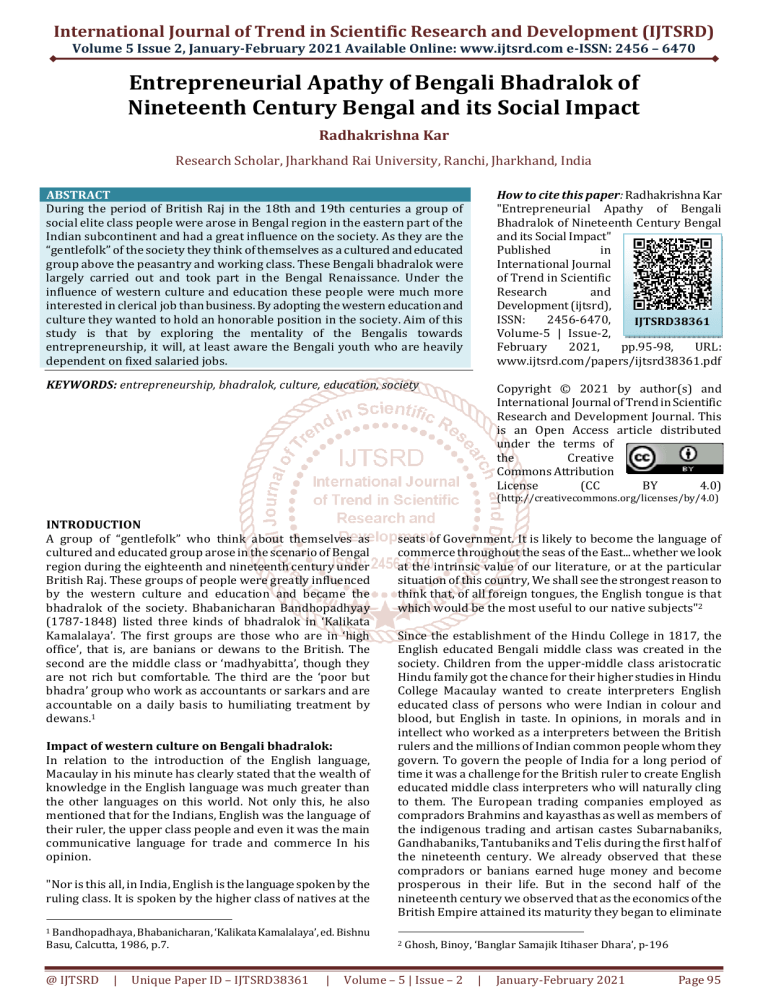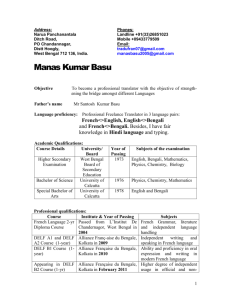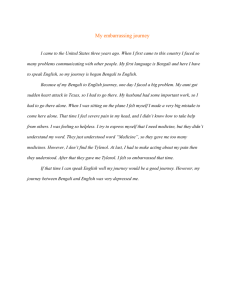
International Journal of Trend in Scientific Research and Development (IJTSRD)
Volume 5 Issue 2, January-February 2021 Available Online: www.ijtsrd.com e-ISSN: 2456 – 6470
Entrepreneurial Apathy of Bengali Bhadralok of
Nineteenth Century Bengal and its Social Impact
Radhakrishna Kar
Research Scholar, Jharkhand Rai University, Ranchi, Jharkhand, India
ABSTRACT
During the period of British Raj in the 18th and 19th centuries a group of
social elite class people were arose in Bengal region in the eastern part of the
Indian subcontinent and had a great influence on the society. As they are the
“gentlefolk” of the society they think of themselves as a cultured and educated
group above the peasantry and working class. These Bengali bhadralok were
largely carried out and took part in the Bengal Renaissance. Under the
influence of western culture and education these people were much more
interested in clerical job than business. By adopting the western education and
culture they wanted to hold an honorable position in the society. Aim of this
study is that by exploring the mentality of the Bengalis towards
entrepreneurship, it will, at least aware the Bengali youth who are heavily
dependent on fixed salaried jobs.
How to cite this paper: Radhakrishna Kar
"Entrepreneurial Apathy of Bengali
Bhadralok of Nineteenth Century Bengal
and its Social Impact"
Published
in
International Journal
of Trend in Scientific
Research
and
Development (ijtsrd),
ISSN:
2456-6470,
IJTSRD38361
Volume-5 | Issue-2,
February
2021,
pp.95-98,
URL:
www.ijtsrd.com/papers/ijtsrd38361.pdf
KEYWORDS: entrepreneurship, bhadralok, culture, education, society
Copyright © 2021 by author(s) and
International Journal of Trend in Scientific
Research and Development Journal. This
is an Open Access article distributed
under the terms of
the
Creative
Commons Attribution
License
(CC
BY
4.0)
(http://creativecommons.org/licenses/by/4.0)
INTRODUCTION
A group of “gentlefolk” who think about themselves as
cultured and educated group arose in the scenario of Bengal
region during the eighteenth and nineteenth century under
British Raj. These groups of people were greatly influenced
by the western culture and education and became the
bhadralok of the society. Bhabanicharan Bandhopadhyay
(1787-1848) listed three kinds of bhadralok in ‘Kalikata
Kamalalaya’. The first groups are those who are in ‘high
office’, that is, are banians or dewans to the British. The
second are the middle class or ‘madhyabitta’, though they
are not rich but comfortable. The third are the ‘poor but
bhadra’ group who work as accountants or sarkars and are
accountable on a daily basis to humiliating treatment by
dewans.1
Impact of western culture on Bengali bhadralok:
In relation to the introduction of the English language,
Macaulay in his minute has clearly stated that the wealth of
knowledge in the English language was much greater than
the other languages on this world. Not only this, he also
mentioned that for the Indians, English was the language of
their ruler, the upper class people and even it was the main
communicative language for trade and commerce In his
opinion.
"Nor is this all, in India, English is the language spoken by the
ruling class. It is spoken by the higher class of natives at the
1 Bandhopadhaya, Bhabanicharan, ‘Kalikata Kamalalaya’, ed. Bishnu
Basu, Calcutta, 1986, p.7.
@ IJTSRD
|
Unique Paper ID – IJTSRD38361
|
seats of Government. It is likely to become the language of
commerce throughout the seas of the East... whether we look
at the intrinsic value of our literature, or at the particular
situation of this country, We shall see the strongest reason to
think that, of all foreign tongues, the English tongue is that
which would be the most useful to our native subjects"2
Since the establishment of the Hindu College in 1817, the
English educated Bengali middle class was created in the
society. Children from the upper-middle class aristocratic
Hindu family got the chance for their higher studies in Hindu
College Macaulay wanted to create interpreters English
educated class of persons who were Indian in colour and
blood, but English in taste. In opinions, in morals and in
intellect who worked as a interpreters between the British
rulers and the millions of Indian common people whom they
govern. To govern the people of India for a long period of
time it was a challenge for the British ruler to create English
educated middle class interpreters who will naturally cling
to them. The European trading companies employed as
compradors Brahmins and kayasthas as well as members of
the indigenous trading and artisan castes Subarnabaniks,
Gandhabaniks, Tantubaniks and Telis during the first half of
the nineteenth century. We already observed that these
compradors or banians earned huge money and become
prosperous in their life. But in the second half of the
nineteenth century we observed that as the economics of the
British Empire attained its maturity they began to eliminate
2
Ghosh, Binoy, ‘Banglar Samajik Itihaser Dhara’, p-196
Volume – 5 | Issue – 2
|
January-February 2021
Page 95
International Journal of Trend in Scientific Research and Development (IJTSRD) @ www.ijtsrd.com eISSN: 2456-6470
these banians from modern business. Thus, the indigenous
Bengali elite wanted to secure their future by investing their
money on land business. The permanent settlement offered
opportunities for investment in landed estates and become
the land lord or Zamindars. And for them this was the
hallmark of their social status. They provoked with the
cunning plan of the British rulers and the indigenous Bengali
elite turned its back on business and left modern industry
and international commerce in Calcutta to European. The
newly created Zamindars wanted to secure the life of their
next generation through administrative professional and
intellectual occupations. On the basis of their newly acquired
English education the colonial rule of the British Government
directly or indirectly made the Bengalis overwhelmingly
dependent on service clerical Jobs, the chakri.
Becoming a university graduate and getting a clerical job
was the ultimate goal of life of the Bengali youth. The
economic crises involving the collapse of the agency houses
and the union Bank, combined with the infusion of British
finance capital, had deleterious effects on Bengali
entrepreneurs and many of them forfeited their fortunes. On
the other hand the permanent settlement of 1793, had
inaugurated a new order of land holding that would have
profound implications for the one-time dewans and banians.
The profitability of Zamindari and the decreasing
opportunities for commerce in the urban areas led the more
astute leading Bengali families of Calcutta to become renters
on a substantial scale. The Bengali entrepreneurs shifted
their attention from urban based trade and commerce and
commodity production to other alternative commercial
ventures like acquiring Zamindary property which they
considered comparatively safe for investment and
supplement their Zamindari income by undertaking various
urban professions. Gradually this become the fashion of the
Bengali middle-classes gentleman, the bhadraloks
concentrated their attention on educating their wards in
English schools so that they could get an employment in the
British ... commercial firms or start an independent
profession like that of law which also required English
education. So the foundation of the Hindu College as we
already mention in 1817 had played a vital role for the
production of successive batches of highly educated youth
who were much more interested in getting employment in
administration, education and legal profession than taking
up business as a career though some of them came from
successful business families of Kolkata and its suburbs. Even
the leading business families of the nineteenth century
Bengal were worried not about the revival of their business
tradition but for future of education of their wards. To the
Bengali bhadraloks education become a kind of ritual. The
attachment of the Bengali bhadraloks to education stood for
an attitude that tended to infiltrate downwards, notably in to
some higher artisan castes and well to do peasants.3
In the field of education, achievement usually extends to the
profession. During the nineteenth century money and
education were interrelated. Education was dependent on
money and money was dependent on acquired education
through various professions. The English educated Bengali
bhadraloks wanted to develop their social status through
education and the acquired money from the clerical
3 Sinha, Pradip, Social Changes, in N.K.Sinha(ed), The History of
Bengal, 1757- 1905, 2nd edition, University of Calcutta, pp-384-426.
@ IJTSRD
|
Unique Paper ID – IJTSRD38361
|
professions. To maintain this trends of the bhadralok
mentality the English education become a matter of
attraction. The aim was like English education - chakri money - status. Mainly in the nineteenth century the Bengali
educated middle class intellectual were emerged in the
society. The influenced and number of their classes
increased as a result of the spread of English education and
modern education. In the early nineteenth century the
opportunity of English education was limited within the
upper class rich families of Bengal. For example Dev family
of Sovabazer, Two Dutta families of Hatkhola in Rambagan,
Tagore family of Jorasanko, Singha family, Singha family of
Paikpara, Mullick family, Laha family, Seal family etc. All
these wealthy rich families in the nineteenth century in
succession dominated the educated intellectual class of
Bengal society. In the descent they acquired the bhadralok
image in their life. The ancestors of these families of Bengal
acquired a huge capital through their various professions
and now wanted to invest these capitals for the well being of
their next generation. So through money and education they
acquired the higher and elite position in the society. This
education policy followed until about the middle of the
nineteenth century. Then after the establishment of Calcutta
University in 1857 the scope to acquire English education
was opened for the common middle class people. so what we
understand as modern educated Bengali middle class and
intellectual class developed from the second half of the
nineteenth century. In the Somprakash Patrika (1881 1882) the editor discussed why the Bengali was attracted
towards English education. In that time the parents of our
country wanted to educate their child only to acquire a job.
The main goal of their life was to get a job under the British
Government. The people of our country never thought that
the education of their children would help to benefit the
country or they never gave their free opinion for the well
being of the country. Their only aim was to get a clerical job
under the Government and to be well established in the
society as a bhadralok. In every aspect of their life they got
respect for their Chakri. Society, parents, and guardians
everybody praised them for their job only. While earning a
lot of money from other than the Chakri, but did not get that
kind of respect or position in the society. If any British
employer praised their employee then the employee thought
that their life was blessed. The highest honor in society was
for those who hold high positions in Chakri and who got a
huge salary from their job. They hold that bhadralok image
perfectly in the society. But the society did not appreciate
those people who engaged themselves for the benefit of their
own country or who earned more from their individual free
business. The parents of the bhadralok also used to feel
honoured for the high position of their children8. So, during
the British colonized period chaki was become the strongest
elevator for social status among the Bengali bhadralok. As
Chakri got them a high standard image with in the family and
society so the Bengali were no longer wanted to engaged
themselves in any laborious worker any independent work.
Throughout their life they became able to maintain their
luxurious life because of their job. So, the young educated
Bengalis were become job-dependent, only to get the social
status and honor in their life. Even the Bengali youth from
the artizen class also wanted to educated themselves in the
western culture. After completing their education they also
become the aspiring candidates for service or clerical jobs.
Thus from the very beginning of the English education it
become mercenary and commercial so after the
Volume – 5 | Issue – 2
|
January-February 2021
Page 96
International Journal of Trend in Scientific Research and Development (IJTSRD) @ www.ijtsrd.com eISSN: 2456-6470
establishment of the Calcutta University during nineteenth century, the middle class bhadralok were increased day by day who
rushed for the government job. Chakri or vocalots became main goal of their life. The census report of Calcutta 1871, 1881,
1901 also gave a clear picture of this tradition.4
1881
Government employee
Law and justice group:
Police group:
Jail group:
Castoms, Abgari group:
Telegraph:
Post office:
Other group:
Municipality &port employee:
167
3283
105
121
58
31
490
57
1891
Clerk of Govt.office:
Clerk of business office:
Barister:
Solicitor:
Moktar:
6353
7857
74
61
1039
Barister:
Unil:
Atorney:
Moktar:
Teacher & professor:
Civil Engineer:
Shop keepers:
Clerk:
51
350
31
510
1752
32
14131
16315
1901
Govt. employee:
Businessman (small):
Intellectuals:
18950
125,679
22,530
However from the census report it is clear that the so called middle class bhadralok which was established under the British
colonial rule in the mid-1800s were rushed for the clerical job for their better future and to maintain the image and honor in
the society. Thus, the British government replaced the traditional Indian education system in 1835 with a western education
system only to educate a class of men who could serve as interpreters and work in the new government as their obedient
employee. Many of the Bengali educated earned huge money by using their education and become called the elite class of the
society. During nineteenth century the elite class Bengali who earned money and honor only because of their devotion towards
English education were5 –
Madhusudan Gupta
Krishnamohan Mallik
Rasikkrishna Mallik
Radhanath Sikhder
Ramgopal Ghosh
Pyarichand Mitra
Kishori Chand Mitra
Rajendralal Mitra
Shibchandra Deb
Harchadra Ghosh
Pyaricharan Sarkar
Digambar Mitra
Dakshinaranjan Mukhopadhyaya.
Rajnarayan Basu
Durgacharan Bandyopadhya
Surendranath Bondhopadhya
Iswarchandra Vidyasagar
Madhusudan Dutta
Bankimchandra Chattopadhya
Harishchandra Mukhopadhyaya
Durgacharan Laha
Keshabchandra Sen
Shibnath Sashtri
Umeschandra Dutta
Bipinchandra Pal
From the history of the families of their educated elite class of Bengal it was clear that only because of the English education
they got a high respectable position as bhadralok in the society. During colonial period this English education was the valuable
passport getting any type of Govt. salaried job. So day by day this English education becomes a matter of honor for the Bengali
elite class. The Anglo-vernacular schools were increasing rapidly and a huge number of students came under the influence of
education of the growing popularity of the Calcutta University. The Bengalis were truely attracted towards English education
and rushed for Chakri and vokalati and become indifference towards their commercial side. This indifference of Bengalis to
trade and commerce had brought disaster to their economic life. Even today the Bengalis have to suffer for this apathy towards
trade and commerce. In that time the elite class did not understand the value of industrialization. As a result a huge number of
educated youth have to suffer for the problem of unemployment.
Conclusion:
In Bengal, business and businessmen are treated with suspicion and looked down upon since the nineteenth century. Whatever
may be their financial position, their social status is much lower than the landed gentries and educated professionals like the
teachers’ doctors and lawyers. This attitude still dominates the social values and ethos of Bengal society. One of the reasons for
the disruption of the normal historical momentum of entrepreneurship is the social negligence towards the merchant class in
Bengal and Indian society especially in Bengali society. They never got any kind of inspiration or rewards for their
achievements in the business field for which no social status and power is available. As a result though they had acquired
enough capital for investment in business but they never became the capitalist. However the Bengalis were truly attracted
4
5
Ghosh, Binoy, ‘Banglar Nabajagriti’(Renaissance of Bengal), p-66.
Ghosh, Binoy, ‘Banglar Samajik Itihaser Dhara’, p-201.
@ IJTSRD
|
Unique Paper ID – IJTSRD38361
|
Volume – 5 | Issue – 2
|
January-February 2021
Page 97
International Journal of Trend in Scientific Research and Development (IJTSRD) @ www.ijtsrd.com eISSN: 2456-6470
towards English education and rushed for Chakri and vokalati and become indifference towards their commercial side. This
indifference of Bengalis to trade and commerce had brought disaster to their economic life. Even today the Bengalis have to
suffer for this apathy towards trade and commerce. In that time the elite class did not understand the value of industrialization.
As a result a huge number of educated youth have to suffer for the problem of unemployment.
Reference:
[1] Ghosh, Binoy, ‘Banglar Samajik Itihaser Dhara,
Prakash Bhawan, Calcutta, 1968.
[2]
Bandhapadhyay,
Bhabanicharan,
‘Kalikata
Kamalalaya’, ed. Bishnu Basu, Calcutta, 1986.
[3]
Sinha, Pradip, Social Changes in N.K.Sinha(ed), ‘The
History of Bengal’, 2nd edition, University of Calcutta.
@ IJTSRD
|
Unique Paper ID – IJTSRD38361
|
[4]
Ghosh, Binoy, ‘Banglar Nabajagriti’(Renaissance of
Bengal), Orient Longman Ltd, 1979.
[5]
Sen, Ramcomul: English Bengali Dictionary, Calcutta
1834.
[6]
Smith, George: The Life of Alexander Duff. 2, Vols.
London 1879, vol-1.
[7]
Palit, Chittabrata, ‘Hundred Years of Bengali Business
Enterprise’, Shriropa, Kolkata, 2016.
Volume – 5 | Issue – 2
|
January-February 2021
Page 98





